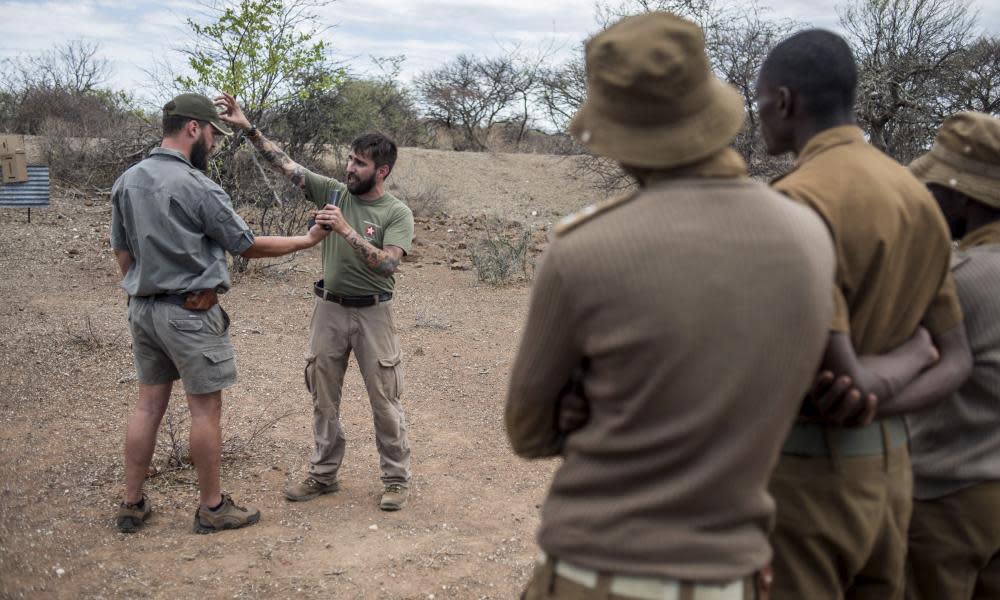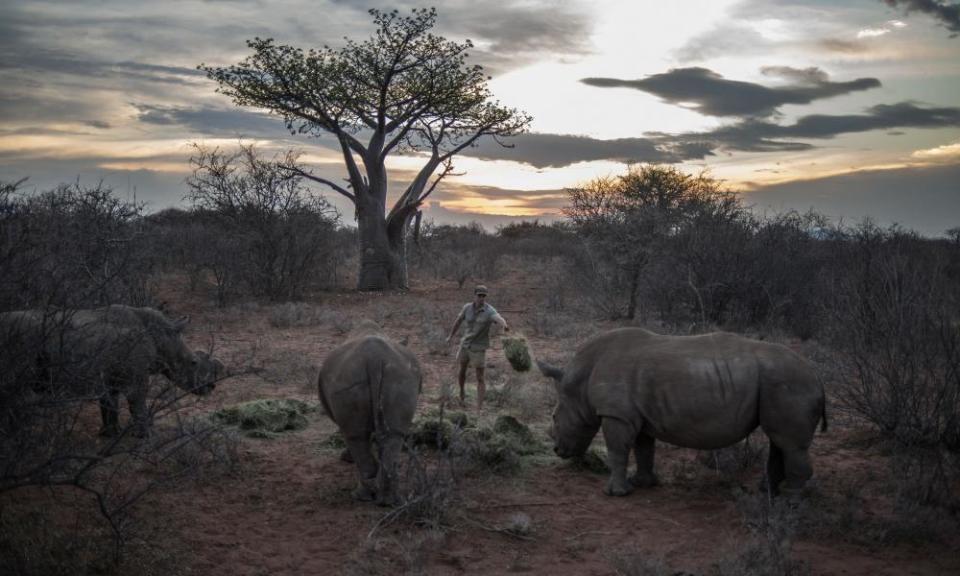US army veterans find peace in protecting rhinos from poaching

The sun has set over the scrubby savannah. The moon is full. It is time for Ryan Tate and his men to go to work. In camouflage fatigues, they check their weapons and head to the vehicles.
Somewhere beyond the ring of light cast by the campfire, out in the vast dark expanse of thornbushes, baobab trees, rocks and grass, are the rhinos. Somewhere, too, may be the poachers who will kill them to get their precious horns.
The job of Tate, a 32-year-old former US Marine, and the group of US military veterans he has assembled in a remote private reserve in the far north of South Africa is simple: keep the rhinos and the rest of the game in the bush around their remote base alive.
The men are not mercenaries, or park rangers –they work for Tate’s Veterans Empowered To Protect African Wildlife (Vetpaw), a US-based nonprofit organisation funded by private donations. All have seen combat, often with elite military units, in Iraq, Afghanistan and elsewhere.
All these veterans with billions of dollars of training and the government doesn’t use them. I saw a need in two places
Ryan Tate
Though equipped with vehicles, trail bikes, assault rifles, sniper suits and radios, the most important weapons in the war against poaching, Tate believes, are the skills and experiences his team gained on successive deployments in conflict zones over the last decade and a half.
“We are here for free. We are not going anywhere. Whether it is cold or hot, day or night ... we want to work with anyone who needs help,” Tate says.
The initiative is not without controversy. Some experts fear “green militarisation” and an arms race between poachers and gamekeepers. Others believe deploying American former soldiers to fight criminals in South Africa undermines the troubled country’s already fragile state.
But the scale of the challenge of protecting South Africa’s rhinos is clear to everyone, with a rise in poaching in recent years threatening to reverse conservation gains made over decades.
Though rhino horns are made of keratin, the same substance as fingernails, a kilo is worth up to $65,000. The demand comes from East Asia, where rhino horn is seen as a potent natural medicine and status symbol, and is met by international networks linking dirt-poor villages in southern Africa with traffickers and eventually buyers. Patchy law enforcement, corruption and poverty combine to exacerbate the problem.
In South Africa, home to 80% of the world’s wild rhinos, only 13 were poached in 2007. In 2015, the total was nearly 1,200, though losses have declined slightly since.
“These criminal gangs are armed to the teeth, well-funded and part of transnational syndicates who will stop at nothing,” a South African government spokesman said in February.
Tate founded Vetpaw after seeing a documentary about poaching and the deaths of park rangers in Africa. His team now work on a dozen private game reserves covering a total of around 200,000 hectares in Limpopo, the country’s northernmost province. One advantage for local landowners is the protection heavily armed combat veterans provide against the violent break-ins feared by so many South Africans, particularly on isolated rural farmsteads. The team has also run training courses for local guides and security staff.
But if one aim of Vetpaw is to counter poaching, another is to help combat veterans in the US, where former servicemen suffer high levels of unemployment and mental illness.
“Everyone gets PTSD when they come back from war … you are never going to get the brotherhood, the intensity again … [There are] all these veterans with billions of dollars of training and the government doesn’t use them. I saw a need in two places and just put them together,” says Tate.
The Vetpaw base in the bush in Limpopo, though considerably less spartan than most “forward operating bases”, is familiar to anyone who has spent time with US forces. There is a rack of helmets and body armour, a detailed map pinned to the wall and banners with the insignia of US special forces hung above a dining table. There is the banter, and the jargon. The team talks of tactical missions, intel, and “bad guys”.
Despite lines on a whiteboard reading “In the absence of a plan move towards the sound of gunfire and kill everything,” Tate says he has selected combat veterans because they will resist the temptation to use lethal force. Poachers are told to put down their arms, and then handed over to the police.
“This is textbook counterinsurgency here. It’s unconventional warfare,” says Kevin, a British-born veteran who quit US elite special forces last year after a decade and a half largely on active duty, frequently in close quarter combat. “Shooting and killing is easy. The hardest thing is not shooting but figuring stuff out ... if you kill someone do you turn a family, a village against you?” Like other members of Vetpaw, Kevin did not want to be identified by his full name.
The thinking is rooted in the “hearts and minds” approach developed by the US military a decade ago when senior officers realised their massive firepower was winning battles, but not campaigns.
Tate says poachers coerce local communities into providing safe houses or other support – much as US army officers once explained assistance given to insurgents in Iraq or Afghanistan.

Francois Meyer, who grew up in northern Limpopo and runs a local conservation NGO that works with Vetpaw, says villages vary. “In some, the poachers are seen as heroes. They give out money. There is a kind of Robin Hood syndrome. Taking from the rich white man to give to the poor. But in others, the poachers get the living shit kicked out of them,” Meyer said.
There is little consensus on what response to the problem of poaching might work best, and fierce debate rages among conservationists, farmers and officials.
A moratorium on the domestic trade in rhino horn in South Africa implemented in 2009 was controversially overturned by a court in April. Though there has been an increase in arrest of poachers, there are few convictions and “a lack of political will” means many of the “kingpins” remain untouched.
The complexities of the issue seem distant to the veterans out on patrol in remote northern Limpopo, high on a rocky crag, listening to the grunt of a leopard or the cough of the baboons in the gathering night.
“After what I’ve done, I couldn’t just go and do a nine to five. I’ve never had nightmares or flashbacks or anything … [but] after years of doing what I’ve done, this is good for the soul,” says Kevin, the former Green Beret. “It’s in a good cause and you get to watch the African sunset.”

 Yahoo News
Yahoo News 
